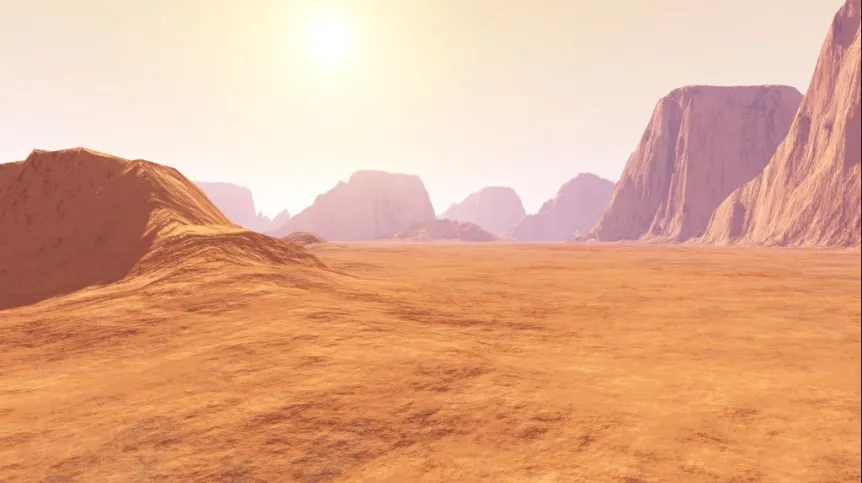
Legendary Rover Team from Rzeszów University of Technology for the second time won the prestigious race Mars rovers competition - University Rover Challenge, which ended in the US. Third place went to the team Continuum from the University of Wroclaw.
University Rover Challenge (URC) is a prestigious international competition of Mars rover built by students from all over the world. Students competed on 2 - 4 June in the American desert in Utah near the Mars base analogue MDRS. Among the 28 teams from all over the world there were seven teams from Poland.
First place in the competition - as in 2015 - took the Legendary Rover Team from Rzeszów University of Technology. In five URC competitions the students scored more than 450 points.
Rzeszów University of Technology team, which took part in the competition, has eight members (one woman and seven men). The core team consists of students of the Faculty of Mechanical Engineering and Aeronautics. In an interview with PAP after the success of Rzeszów students, dean of the faculty Prof. Jarosław Sęp joked that these competitions are slowly becoming Polish specialty. "It is not a coincidence, if it happens for a second time in a row, and the competition does not get weaker, quite the opposite" - he said.
He stressed that he was very happy about this success and the fact that such students come to Rzeszów University of Technology. "Because it\'s an extraordinary joy and pride for Rzeszów University of Technology. This is where this team of students was formed, this is where the winning concept was created" - said Sęp.
He said that university employees try to support students in their activities, "but without their personal commitment, their passion such success would certainly not be possible".
In second place - with 368 points - was the WSU Everett Engineering Club team from US Washington State University. Third place on the podium took another Polish team: Continuum from the University of Wroclaw, who scored more than 340 points.
Among the best fourteen teams, which competed in the Ares finals, there were three more Polish teams. In fifth place were Raptors from Lodz University of Technology, #next team from Bialystok University of Technology was seventh, and MS Rover Team from the Czestochowa University of Technology took tenth place.
Grzegorz Granosik, Lodz University of Technology professor and supervisor of the Raptors team classified in fifth place told PAP that the competition took place "under extreme conditions, the temperature reached 100 deg. F (approx. 37.7 deg. C - PAP), and cloudless sky and rocky surroundings did not give respite". In his view, the competition was at a high level, as evidenced by the very small score differences between the second and tenth places.
"The competition not only tested the technical potential of the robots, but also team members\' knowledge of the geology of Mars. We were surprised by specialist interview with the judges in the research competition concerning the study of soil samples. However, our final result in this category turned out to be pretty good. On the other hand, in the terrain traversing competition we stuck to the prepared strategy of traversing the hilly and rocky desert terrain, which gave us the full set of points with the best time. Our debut in the competition of this magnitude has been a success, and we consider the fifth place a challenge for the next year" - he concluded.
In this year\'s University Rover Challenge - for the first time in the history of the competition - teams were assigned to participate in one of the two finals. In the Ares finals were the teams that scored highest in the earlier semifinals. The teams competing in the second finals Phobos received worse result in the semifinals and battled for places in the second half of the competition table.
Best in the Phobos finals was American Mars Rover Design Team from the Missouri University of Science & Technology. Second place went to the team Rovata of Chungnam National University in South Korea. Third place went to Polish team: Project Scorpio from Wroclaw University of Technology. SKA Robotics from Warsaw University of Technology finished fourteenth.
Teams from Polish universities compete in the URC since 2009. Polish students had their first success in 2011, when the rover Magma2 built at Białystok University of Technology took the top of the podium. Students from Białystok University of Technology won again in 2013 and 2014 year with the rovers Hyperion and Hyperion 2.
In 2015, for the first time the Legendary Rover Team from Rzeszów University of Technology won the competition. Third place went to the team Scorpio from Wroclaw University of Technology, and the fourth to the rover #next built by students from Białystok University of Technology. Among the top ten teams, as many as five teams were Polish.
The success of Polish students in building the Mars rovers has contributed, among others, to granting Poland the right to host the European Rover Challenge - European edition of the University Rover Challenge. In 2016, the event will be held on 10 - 13 September at the Exhibition and Congress Centre in Jasionka (Podkarpackie).
PAP - Science and Scholarship in Poland
api/ ekr/ bap/ akw/ mrt/
tr. RL













